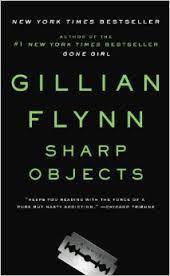 I found this copy of Gillian Flynn’s first novel at my library book sale, so it was worth a pick up. I was definitely interested to read more from this author. But Sharp Objects disappointed.
I found this copy of Gillian Flynn’s first novel at my library book sale, so it was worth a pick up. I was definitely interested to read more from this author. But Sharp Objects disappointed.
At first I thought it was going to be way too disturbing. A little girl has been murdered, her body found with all her teeth pulled out. Another girl is missing and this small town in Missouri is worried it has a serial killer on its hands. Camille, a journalist in Chicago, is sent to research the story because she grew up there. Her boss thinks it’s better to uncover a big story in a small town than try to compete with the big Chicago papers for Chicago news.
Camille is an interesting character. Her sister died from an unspecified illness when she was a young child, and her mother seems to have never recovered. Camille doesn’t know who her father is, and her mother has remarried and now has a teenage daughter, Amma.
Significantly, Camille has struggled most of her life with an addiction to cutting. She cuts words into her skin, and is scarred from neck to feet with words. She spent some time in rehabilitation and doesn’t do it anymore, but still struggles. She also drinks – a lot – and has some real sexual issues. Coming home is clearly a problem for her. I appreciated her struggle between the identity you’ve carved out for yourself as an adult and that feeling that you revert to a child when you step into your childhood home (although as a plot point it seemed a little silly that Camille has to stay in this clearly unhealthy environment while she’s on a work assignment).
The best part of this book is Flynn’s development of this character. Unfortunately, this complexity doesn’t carry into the rest of the story and characters. The creepy mom is exactly that – creepy mom. Half-sister Amma is creepy as well, but rarely seemed like a real human being. I kept wanting to envision her like the teenager in Thirteen but she never emerges as a genuine character.
Flynn introduces a few interesting male characters into the story – her editor, a Kansas City detective, and an 18-year-old murder suspect — but never develops their characters. The editor is something of a father figure and the other two are sexual interests. Flynn is clearly a lot more interested in seriously messed up women, and all the women in this book fit that category.
All of this would be okay if the mystery took center stage in this book, but it never does. The police are portrayed as idiots who aren’t even trying to collect any evidence. Flynn seems more interested in describing the catty moms in the town than really pursuing who killed these girls and why.
I expected disturbing, but halfway into the story it began to feel silly (and obvious). Camille is ridiculously unprofessional, and while I sympathized with her family problems and emotional issues, it’s hard to sympathize with a character who takes drugs handed to her by teenagers.
For me, this book lacked the elements that made Gone Girl such a compelling read.
I read this book for the R.I.P. IX Challenge.

